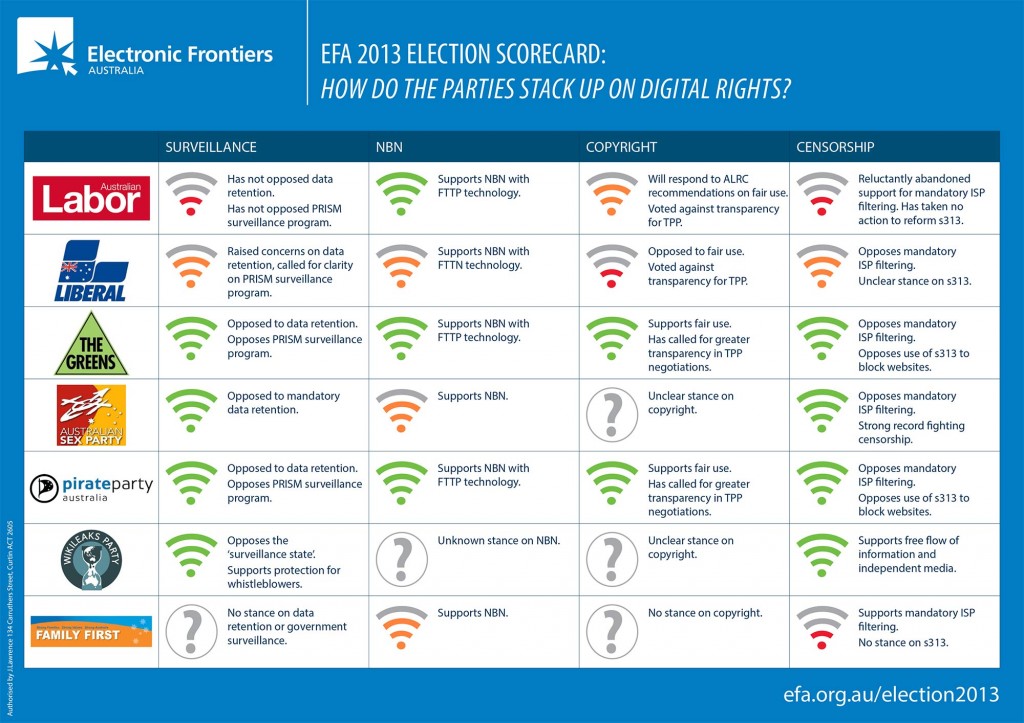Care about digital rights? We certainly do. Enrolled to vote? We hope so. We’ve reviewed a number of the established national parties for their policies on the issues that matter most to us.
We did not receive responses from the Liberal Party, Australian Sex Party and the Wikileaks Party, so we have used publicly-available information for their scores.

Surveillance
MANDATORY DATA RETENTION – this relates to the proposal from the Attorney-General’s Department for the introduction of mandatory retention, for up to two years, of metadata, which means records of all your phone calls (including your location at the time, in the case of mobile phone), emails and other communications. EFA is strongly opposed to this proposal as we believe it would amount to a massive infringement of the privacy of all Australians, by creating massive databases of highly personal information that are almost certain to be breached or misused in some way. The proposal would also infringe the civil liberties of all Australians by treating us all as potential suspects, rather than citizens. EFA also believes that access to metadata should be much more tightly constrained that it is at present and supports calls for the introduction of a requirement for warrants to authorise access to this data.
PRISM – as you’ve no doubt read, the United States’ National Security Agency (NSA) has a range of programs, including PRISM, which together amount to the largest surveillance project in history, and which potentially infringe the privacy and civil liberties of all internet users around the world. Australian law enforcement and intelligence agencies are known to receive information from these programs. EFA strongly opposes such blanket surveillance and believes that the Australian government should be open with the Australian people about the nature of Australia’s involvement in these programs.
National Broadband Network (NBN)
EFA supports the introduction of a truly national broadband network, using the best technology available, which we believe involves the use of fibre to the premises.
Copyright
FAIR USE – EFA is a strong supporter of the reform of Australia’s Copyright Act to include the principle of fair use, as has recently been recommended by the Australian Law Reform Commission. Such a reform would introduce much-needed flexibility, would restore an appropriate balance between the rights of content owners and the rights of consumers, creators and innovators, would realign copyright law with current societal expectations and would create opportunities for the growth of the Australian digital economy.
TRANS-PACIFIC PARTNERSHIP (TPP) – EFA is strongly concerned about the secret ongoing negotiations for the Trans-Pacific Partnership (TPP), a multi-country trade agreement dominated by the United States that has the potential to introduce new, extreme copyright enforcement measures that we believe may threaten the ability of the Australian Parliament to legislate for a copyright appropriate for current Australian society.

Censorship
MANDATORY INTERNET FILTERING – EFA is strongly opposed to internet filtering in any form, as we believe it infringes free speech and is not an effective solution to tackling malicious content. Our Open Internet campaign was successful in forcing the ALP to last year reluctantly abandon its policy for the introduction of mandatory internet filtering.
SECTION 313 – When the ALP abandoned its mandatory internet filtering policy last year, it announced that it would request ISPs to block websites containing ‘the worst of the worst’ of child exploitation material, using a blacklist maintained by Interpol, under the terms of section 313 of the Telecommunications Act. Since then, it has emerged that the Australian Securities and Investments Commission (ASIC) has also used this power to block websites containing fraudulent investment schemes. ASIC’s understanding of how the internet addressing system functions however is quite limited and they inadvertently also blocked many thousands of legitimate websites, including that of Melbourne Free University. EFA is opposed to the use of section 313 in this way and believes the Telecommunications Act should be amended accordingly.
Printing this scorecard
You can download this scorecard as a PDF to enable you to print it out, using the link below, but please note that in order to ensure you comply with the Electoral Act, you will need to add your name and street address (business or residential, but no PO Boxes) after ‘Printed by’ at the bottom of the page. When printing, please ensure you set the image to scale to fit the page size you’re using to ensure that you do not cut off any part of the image.
DOWNLOAD AS PDF (257KB)


